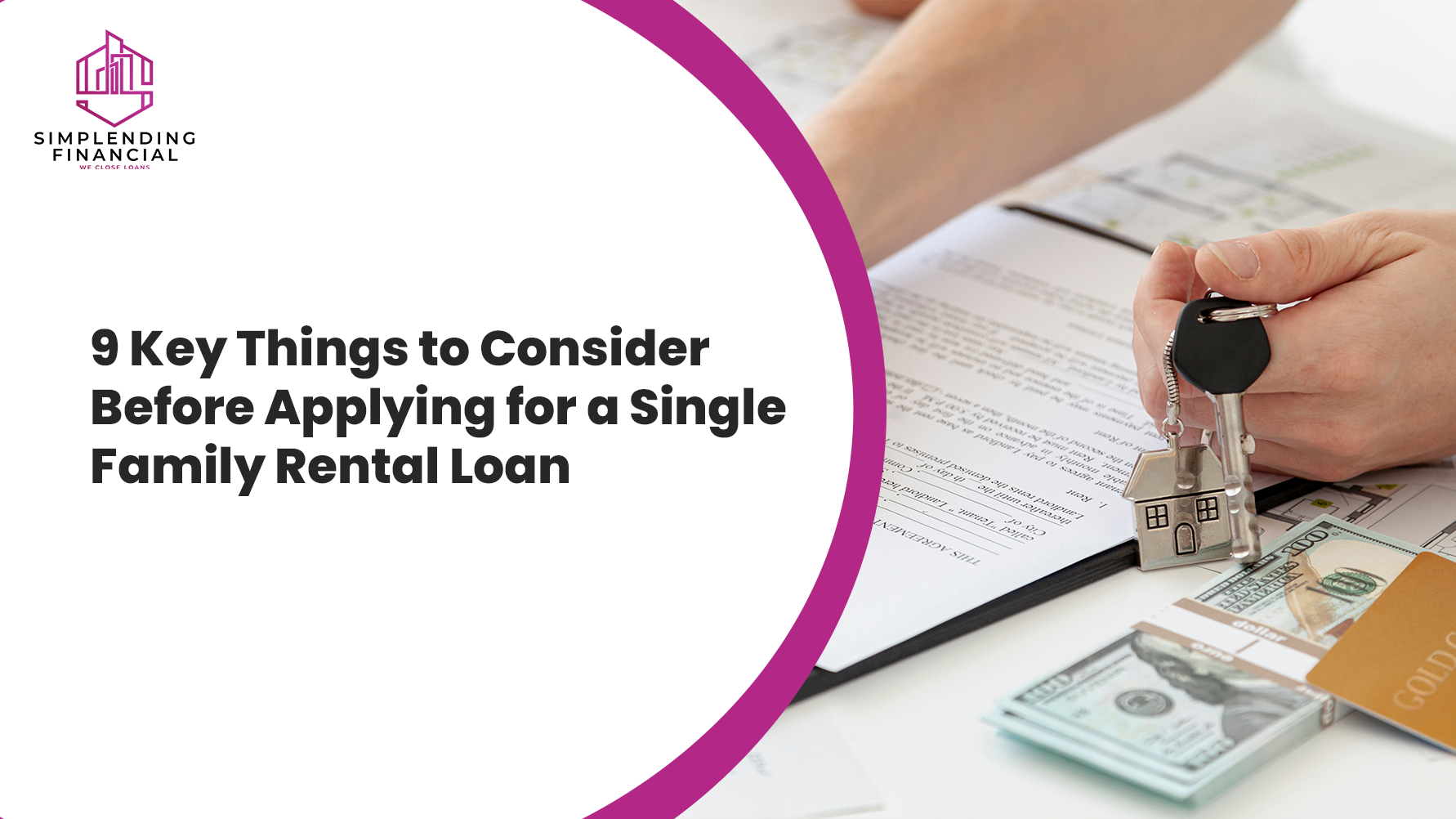9 Key Things to Consider Before Applying for a Single Family Rental Loan
28 Apr 2025
Posted By Admin
It is a smart way to invest in single-family rental (SFR) properties for long-term wealth, generate passive income and get a diversified investment portfolio. However, the success of SFR properties will depend on your decisions even before buying any property. One of the important decisions among them is how to secure right financing? Before directly jumping on a loan application, you must gain knowledge about the process. Today, we will discuss about the 9 key things you must consider before applying for single family rental loans.
Know the single family rental loan types available
You must know the loan types your investor can provide. Below are some common available options:
- Conventional loans: Borrowers with strong credit and income history can go with this type. This loan has stringent qualification criteria.
- DSCR (Debt Service Coverage Ratio) loans: This loan considers the property’s income instead of personal income. This is a popular loan option among investors.
- Portfolio loans: These are given by private lenders. It comes with greater flexibility but with higher interest rates.
- Hard money loans: Short-term financing loans with quick approval process. It is used in case of fix-and-flip loans.
Each loan has its own pros and cons. Choose the one wisely that will match with your investment goals, financial situation and timeline.
Know your credit score
You can get a favorable loan term, in case of excellent credit score. Lenders consider this score to know your creditworthiness. Usually a score of 680 or more is good to secure conventional investment property loans. Although private lenders can approve loans even with less credit score if other factors are favorable.
Estimate the Debt Service Coverage Ratio (DSCR)
Many lenders especially giving you DSCR loans will evaluate your property’s ability to generate rental income that can cover loan payments. You can calculate DSCR through:
DSCR = Net Operating Income (NOI) / Annual Debt Payments
The value of DSCR should be greater than 1.2. That means your property should generate atleast 20% more income that the debt obligations.
In case of low DSCR, you may either need to increase the rental value, minimize expenses or bring more cash.
Evaluate your own financial situation
Lender may evaluate your personal financial condition along with the property’s potential. They may ask for documents like:
- Income and employment
- Tax returns (typically two years)
- Assets and reserves
- Debt-to-income ratio
Even if your DSCR or portfolio loan weights property’s performance more heavily, your financial condition will still matter- especially in case of greater deals.
Down Payment and Cash Reserves
The down payment of rental property is large which may range around 20-25% of the purchase price. Single family rental lenders will inquire about your cash reserves, as they prefer borrowers with sufficient cash balance to cover 6-12 months of mortgage payments.
This will show your capability of handling property’s financial obligations even in case of unexpected vacancies or repairs.
Know the Property's Rent Potential
Estimate your property’s rental value not only for your personal ROI projects, but your lender will also need this figure to decide your loan eligibility.
You can know the rental value with local rental comps, property manager, and other online platforms to estimate potential rent. Don’t consider the best-case scenario; be conservative in estimation to avoid any surprises.
Make a precise investment strategy
Do you want to go with long-term passive income or simply want to make a plan for few years? Will you hire a property manager or intend to manage it by yourself?
Your financial structure should match with your investment strategy. For example, if the holding period of your property is around 30 years, then sticking with long-term fixed mortgage plan should be your choice. If you want to refinance, then it is ideal to go with short-term or interest-only loan.
Know the loan terms and costs
Fine print is a part of every loan, you must read and understand it carefully. Some important terms to check:
- Interest rate: Fixed or adjustable
- Loan term: Is it for 15 or 30 years
- Points and fees: Origination and underwriting fees.
- Prepayment penalties: This can restrict your flexibility to sell or refinance.
Check and compare offers from various lenders. Even a small difference in interest rate can have a major impact on your long-term returns.
Choose the Right Lender
Not all lenders provide the same services you want, especially when it is about investment properties. Some credit unions or banks don’t offer investor-friendly loan products while others are specialize in them.
Choose the one that has in-depth knowledge of real estate investment and offer customized loan products. You can take help from local banks, mortgage brokers to navigate smoothly through this process.
Final Takeaway
Single family rental financing is a cornerstone for your real estate journey. Prepare well for it, know what lenders will require from you, and align your investment and financial goals to improve your chances of loan approval.
Remember real estate is not only about buying property; instead it is about taking smart decisions at each step.


